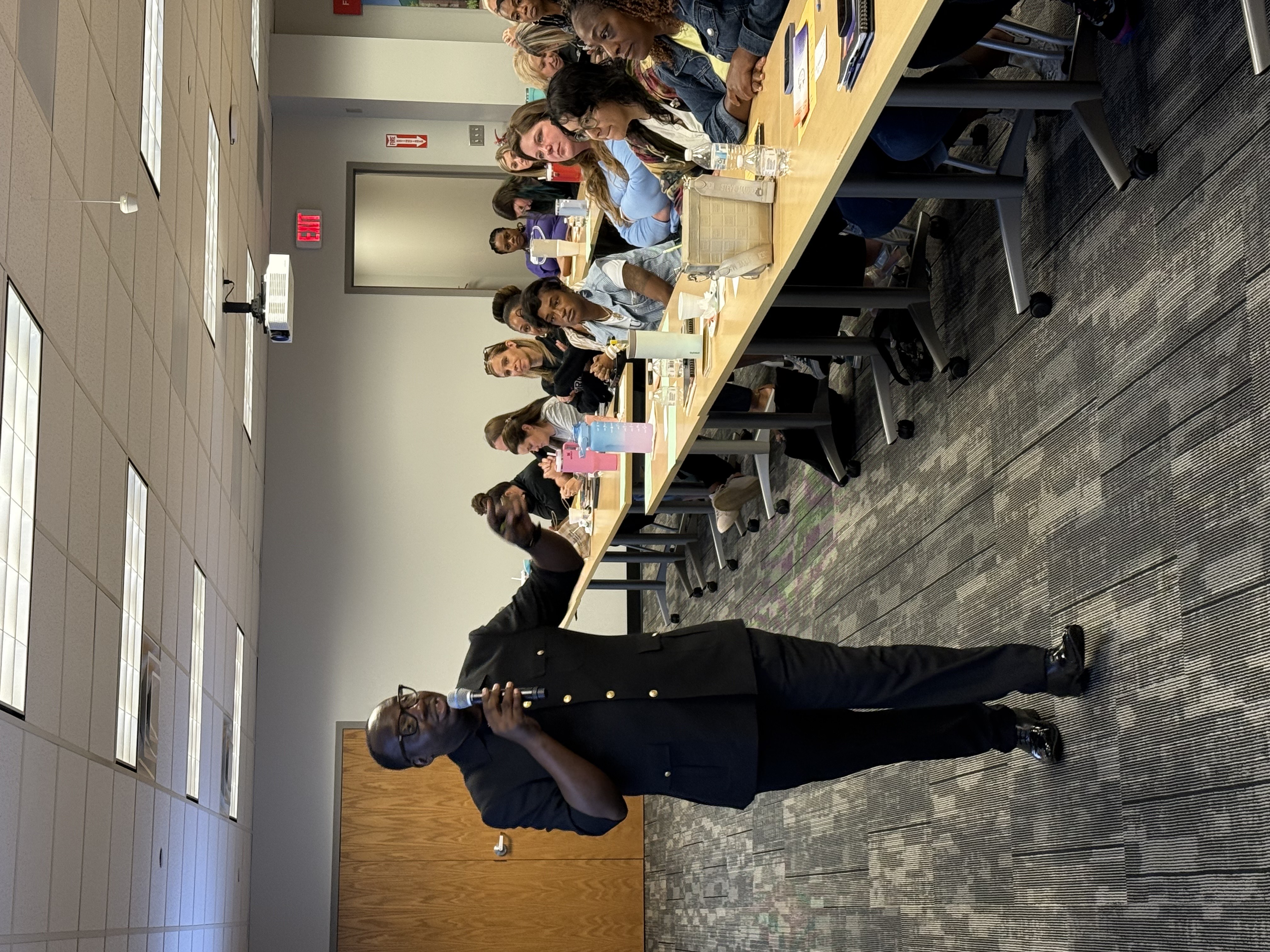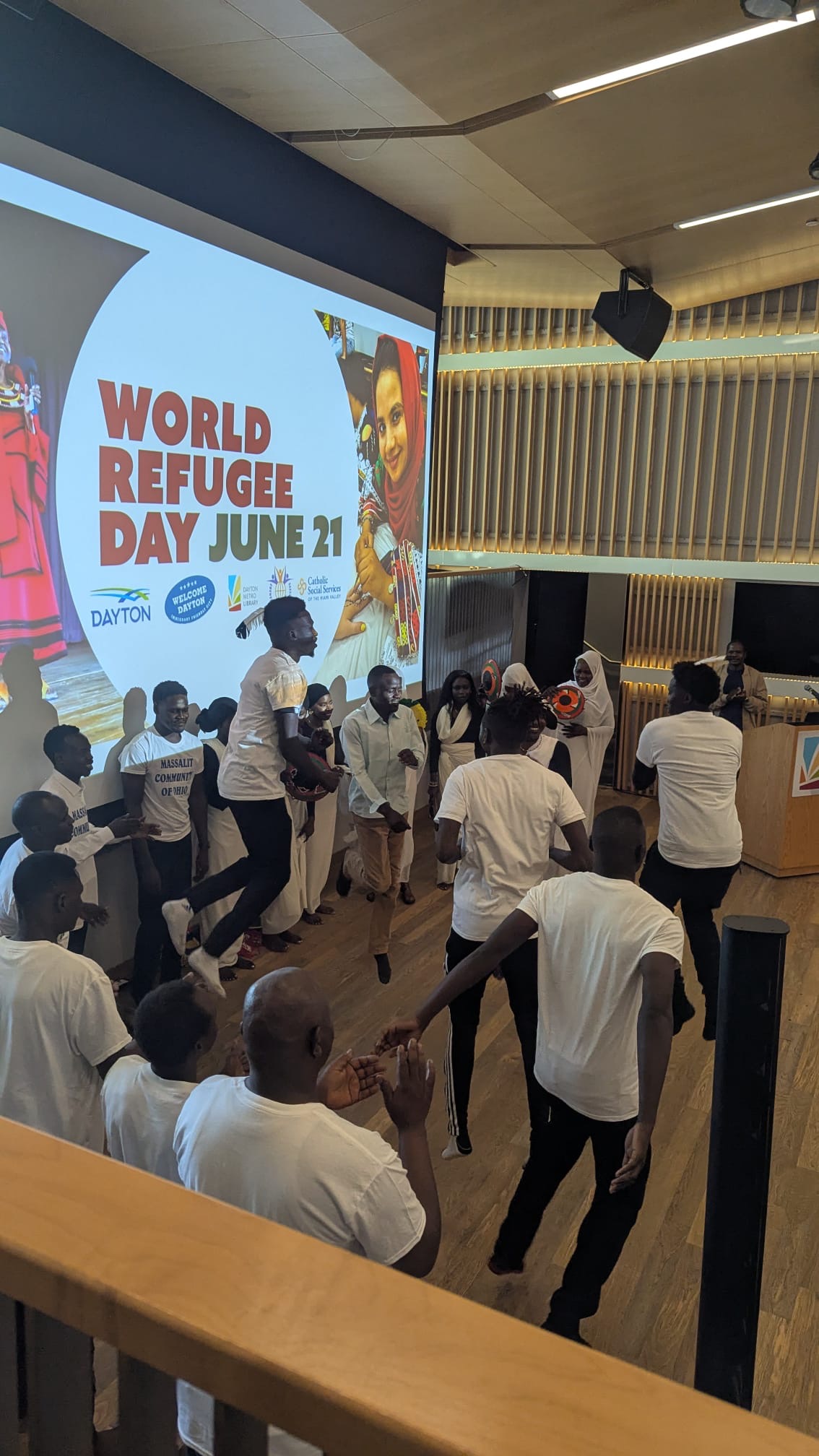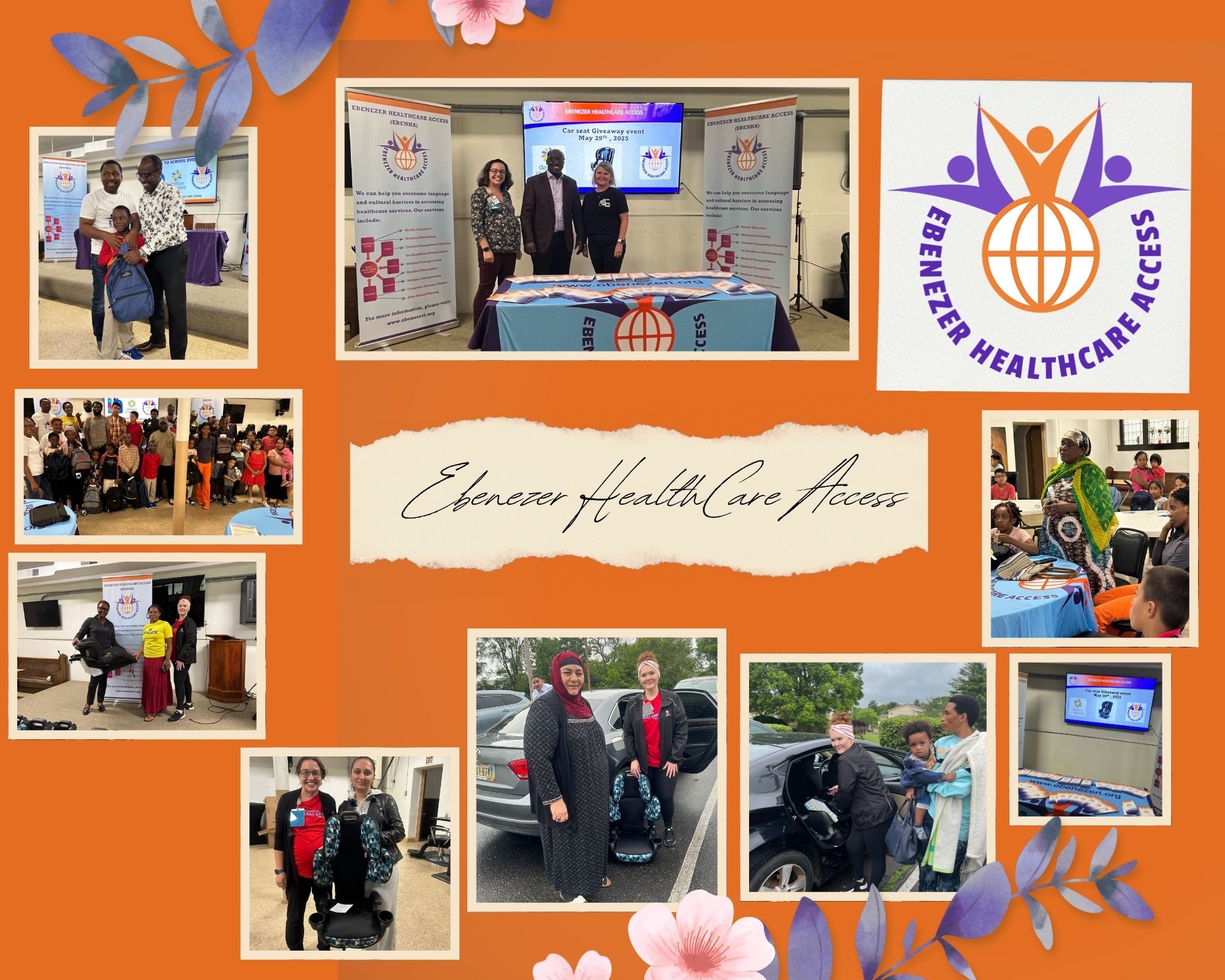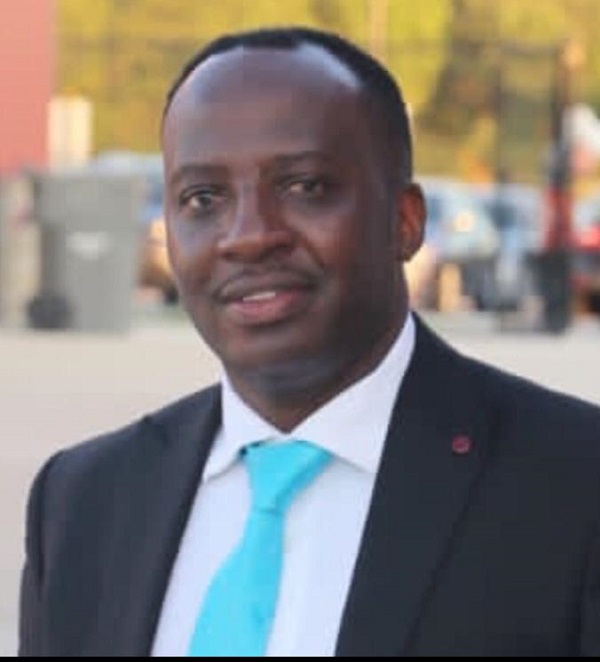Loading...
Support Our Mission
Help us continue providing essential healthcare access to communities in need
Dayton Office
Columbus Office
Cincinnati Office
4400 Reading Rd
Cincinnati, Ohio 45229
Connect With Us
© 2026 Ebenezer Healthcare Access. All rights reserved.
Our Blog
Stay informed about our latest initiatives, success stories, and the impact we're making in immigrant healthcare access.

October 10, 2025
By Tracy Effah, Health Equity InternTuesday, September 30, 2025, Ebenezer Healthcare access facilitated a training session on Cultural Competency in Healthcare: Building Trust and Effective Communication with Immigrant Families for the organization Help Me Grow. Nurses, community health workers, social workers, and teachers who provide health support to underserved families showed a strong interest in learning how to improve the quality of care for immigrant and refugee families. The session brought together many important ideas that highlight how cultural competency plays a key role in better healthcare.Now, you may ask what cultural competency is and why it is needed in the healthcare field. Cultural competency is the ability to interact, communicate, and understand people from diverse cultural backgrounds. Different cultural beliefs can shape a person’s behaviors, expectations, and views on health, which makes it important for providers to practice cultural humility and create a safe, supportive environment. Healthcare providers have the responsibility to provide equitable care that meets the needs of all populations. A foundation built on this helps providers see how culture directly influences patient interactions and outcomes. Specifically looking at the immigrant and refugee families in Dayton, Ebenezer Healthcare Access has observed many challenges they face. The migration journey itself can take a toll on both physical and mental health, and families often encounter barriers once they try to access care. These barriers include language differences, fear related to immigration status, and confusion when navigating the U.S. healthcare system. On top of this, social determinations of health, such as housing, transportation, education, and social integration, add extra layers of difficulty. Ebenezer Healthcare Access’s mission is to help address and overcome these barriers because every individual deserves the opportunity to receive quality healthcare and live a quality life. This is what makes the training especially meaningful and beneficial for the Dayton community. Lastly, once these ideas were established, the next step was focusing on real skills and tools that providers can use in their work every day. Participants practice culturally sensitive communication strategies such as asking respectful questions, noticing both verbal and non-verbal cues, and avoiding assumptions or stereotypes when working with families. They were also introduced to country-specific health profiles that help providers better understand patient backgrounds and adapt care accordingly. By approaching sensitive topics like mental health, reproductive health, and end-of-life care with respect for cultural traditions and roles, providers can build trust and stronger relationships with their patients. This training matters because it gives healthcare workers realistic ways to deliver care that is fair, respectful, and effective for immigrant and refugee families.
Read more

June 27, 2025
By Tracy Effah, Health Equity InternCelebrating StrengthEvery year on June 20, communities around the world observe World Refugee Day, a day dedicated to honoring the strength, resilience, and contributions of refugees. Established by the United Nations in 2001, this day brings awareness to the experiences of people who were forced to flee their home country due to war, persecution, or violence. They had no choice but to leave behind all they knew or had to survive. For Dayton, Ohio, World Refugee Day means so much more. Dayton has long been recognized as a welcoming city for immigrants and refugees, and through partnerships with organizations like Welcome Dayton, the city has built a strong support network that uplifts and helps refugees thrive.Welcoming CommunityMany cities in Ohio have a growing population of refugees and immigrants. But what sets Dayton apart is its intentional effort to create an inclusive and safe community for all. Through city initiatives like Welcome Dayton and the work of local organizations such as ours, we are helping them succeed. Ebenezer Healthcare Access' mission is to improve and promote healthcare access by overcoming language and cultural barriers. We help connect refugees and immigrants (as well as underserved populations) with accessible, culturally sensitive healthcare services, which is a part of building a new life in a new place. Because of these efforts, many refugees choose Dayton as their home. The diversity, deep sense of belonging, and compassion make it a place where people don’t just survive, but where they can build a future, raise children, and become a part of a community. What World Refugee Day Looks LikeTo celebrate World Refugee Day, we join events in Cincinnati, Dayton, and Columbus alongside local community partners. These events are filled with music, food, dancing, and storytelling from all around the world. People of all backgrounds and ages come together, not just to celebrate, but to listen, learn, and connect.Why it MattersThis is an impactful reminder that refugees are not outsiders; they are our friends, neighbors, classmates, and coworkers. Which means they are part of our community, and days like this help us be empathetic and build connections to get rid of isolation. This day reminds us that welcoming and embracing others is important. By honoring the journeys of refugees, we show compassion, shared humanity, and justice to these people. And in Dayton specifically, the message is clear: Everyone deserves a place to call home.
Read more

June 9, 2025
By Tracy Effah, Health Equity InternOur vision is to build a community free of health disparities. This extends beyond medical care to encompass the social determinants of health. Things like housing, access to resources, transportation, education, and nutrition all play a role in a person’s well-being. That is why we want to support people where they are and help them overcome these barriers.In 2024 and 2025, we hosted several community outreach events to advance this mission. These included mattresses, car seats, and back-to-school giveaways, as well as transportation support for medical appointments. Through these efforts, we are promoting health, safety, and well-being for the families we serve.According to our 2024 annual report, Ebenezer served 2,796 refugees, immigrants, and other underserved individuals this past year. Our clients come from 24 countries and speak many different languages. These outreach events help them feel welcomed, supported, and connected to the community.Highlighted Community Outreach EventsCar Seat GiveawayThe Car Seat Giveaway, partnered with Dayton Children’s, promotes child safety and is directly connected to transportation as a social determinant of health. Many of the families we serve lack access to safe, properly installed car seats, putting children at risk during daily travel. By providing car seats, we help reduce preventable injuries and lower the number of possible emergency room visits due to car accidents. Certified car seat technicians were also on-site to teach families how to correctly install and use the seats, ensuring long-term safety beyond the event itself. Bed DistributionThe Bed Distribution, in partnership with Secret Smiles of Dayton, supports quality sleep, which improves health outcomes and is connected to housing as a social determinant of health. Too many children and families in our community sleep on the floor or in overcrowded spaces, which can lead to physical and mental health challenges. A bed offers more than just comfort, it supports growth, learning, care, and emotional well-being. Back-to-School GiveawayThe Back-to-School Giveaway/enrollment of preschool children, partnered with Preschool Promise, addressed educational barriers as a social determinant of health. Access to basic school supplies or early readiness helps children feel prepared, confident, and excited to learn. For families facing financial hardship, these supplies could ease the burden and improve health outcomes. According to our 2024 Annual Report's Health Needs Assessment, 85.1 percent of clients are unable to read or write in English, highlighting the importance of supporting children early. In total, we provided 1,726 personal and baby items (including beds, diapers, car seats, school supplies, and more) to the community. These outreach events have a meaningful impact on the families we serve and help us build lasting relationships across the community. We are deeply grateful to our partners and supporters, as these events would not be possible without them. Ebenezer is committed to expanding and growing these efforts in the coming year. Together, we are helping to build healthier families and stronger communities. If you would like to get involved, we invite you to learn more about how to donate, volunteer, or partner with us.
Read more
September 18, 2022
Many refugee, immigrant, and migrant (RIM) community members experience significant cultural, linguistic, and logistical barriers to accessing health information and healthcare, including accurate information about COVID-19, COVID-19 vaccines, and vaccination opportunities. The availability of accurate COVID-19 information that is culturally and linguistically relevant is essential to keeping communities safe. Health messages sometimes change rapidly and organizations may face challenges developing health messaging that reaches all communities, particularly refugees, immigrants, and migrants.Content Validation for Accurate and Relevant MessagingContent validation is a structured process through which bilingual, bicultural community members review materials and provide critical feedback to ensure the material is appropriately designed and translated for the community it is trying to reach. Content validators can provide review and feedback on a wide variety of materials, including print, audio, video, and more.In addition to translation, the content validation process might include adapting layouts, graphics, cultural references, and many other details. Content validators work to create messages that will resonate with the intended community while avoiding any confusion or conflict with local culture and customs.Content Validation in Dayton, OhioEbenezer Healthcare Access, a non-profit organization in Dayton Ohio, helps community members overcome linguistic and cultural barriers to healthcare by providing health education, medical appointment scheduling, transportation to appointments, medical translation and interpretation, and cultural competency training for healthcare professionals. Ebenezer Healthcare Access also addresses different social determinants of health within the RIM population as a Care Coordination Agency under the Dayton Community Pathways HUB system.Ebenezer Healthcare Access produces brochures, slides, and videos to disseminate information about COVID-19 in multiple languages following a thorough multi-step review process that includes content validation: First, scripts in English are reviewed by Ebenezer’s own health education team and by the Montgomery County Public Health Department. Next, Ebenezer’s medical translators translate the material into several languages spoken by clients, including: Kiswahili, Kinyarwanda, Kinyamulenge, Kirundi, and French. Then a 10-person multilingual medical team that includes medical doctors, nurses, physician assistants, and public health professionals reviews the translated resources. During a 2-hour Zoom meeting depending on the material to review, the team gives feedback and suggestions about materials, working systematically through a brochure, slide presentation, or video from beginning to end. Decisions are reached by consensus.Following this review, the materials are edited and published by Ebenezer Healthcare Access in the different languages.Jean de Dieu Mukunzi, Executive Director of Ebenezer Healthcare Access, says: “We do have hospitals here, many health systems, and they have information. But that information is not accessible to immigrant populations. To me, success is giving that information we have, those resources that we have in English, and making them available to refugee and immigrant populations.”
Read more

September 18, 2022
Jean de Dieu Mukunzi, MPH, PMP, has been included in Marquis Who's Who. As in all Marquis Who's Who biographical volumes, individuals profiled are selected based on the current reference value. Factors such as position, noteworthy accomplishments, visibility, and prominence in a field are considered during the selection process.Ebenezer Healthcare Access helps immigrants address their social determinants of health by overcoming language and cultural barriers.Drawing on years of expertise in health care administration, Mr. Mukunzi presently excels as the Founder and Executive Director of Ebenezer Healthcare Access, a non-profit located in Ohio that helps immigrants address their social determinants of health by overcoming language and cultural barriers. In his leadership role, he oversees stakeholders, manages staff, handles contracts, ensures the quality of the organization's services, and collaborates with the city and county governments, health systems, nonprofit organizations, and academic institutions. As part of the organization's management, Mr. Mukunzi manages Ebenezer's finances and reports to the board of trustees.Before his commitment to the current position, he worked in the Medicaid system and he acted also as the Population Health Program Manager for the Ohio State University's Medical Center, one of the most effective health systems in Ohio and the country. Also, before he came to the United States, Jean de Dieu Mukunzi managed a PEPFAR-funded project in Rwanda, significantly reducing HIV prevalence in the country. During his state visit to Rwanda in 2008, U.S. President George W. Bush visited the project because of its positive impact.In addition to his professional career, Mr. Mukunzi's educational background is relevant to health care management. He is the holder of a bachelor's degree in clinical psychology from the University of Rwanda, a master's degree in public health management from Wright State University (USA), and a project management certification from the Project Management Institute. To remain current with industry-related trends, he aligns himself with the Project Management Institute, the Ohio Community Health Worker Association, Welcome Dayton, and Welcoming America.Mr. Mukunzi immigrated to the United States from Rwanda — a journey that he notes had its fair share of challenges. Upon his arrival in the United States, he could not communicate in English, which was one of the first hurdles he needed to overcome. Since then, he has devoted himself to helping others in similar situations, providing them with the tools required for easy integration into local U.S. communities. In partnership with the association of 29 hospitals and health centers in the Miami Valley Region, Mr. Mukunzi was able to start a Care Coordination Program, which currently serves thousands of immigrants in the region. Through Ebenezer Healthcare Access, Mr. Mukunzi started medical translation services with content validation by a multilingual team composed of medical doctors, physicians' assistants, nurse practitioners, and pharmacists. This approach has been named by the National Resource Center for refugees and immigrants; as one of the national best practices for translation.Mr. Mukunzi has worked for many years, volunteering his time with immigrants and collaborating with local academic institutions and health systems to find solutions to better integrate new Americans. He has conducted a research project on Ohio-based refugees and immigrants to assess their health-related requirements. The data from this research has been considered by many as a baseline to help develop healthcare interventions for the refugee immigrant population in the Dayton area.Incredibly proud of his career, which is studded with highlights, Mr. Mukunzi is gratified to have established Ebenezer Healthcare Access as a care coordination agency that assists new Americans in attaining not only health care coverage through Medicaid and Medicare but also assisting them to address their social determinants of health. Looking toward the future, he intends to expand the organization to reach other cities, states, and countries.About Marquis Who's Who®Since 1899, when A. N. Marquis printed the First Edition of Who's Who in America®, Marquis Who's Who® has chronicled the lives of the most accomplished individuals and innovators from every significant field of endeavor, including politics, business, medicine, law, education, art, religion and entertainment. Today, Who's Who in America® remains an essential biographical source for thousands of researchers, journalists, librarians and executive search firms around the world. Marquis® now publishes many Who's Who titles, including Who's Who in America®, Who's Who in the World®, Who's Who in American Law®, Who's Who in Medicine and Healthcare®, Who's Who in Science and Engineering®, and Who's Who in Asia®. Marquis® publications may be visited at the official Marquis Who's Who® website at www.marquiswhoswho.com.
Read more